2019年高考英语 考点一遍过 专题36 祈使句(含解析).doc
祈使句的结构及用法(附练习题与答案)

• 4. No+/名词以上结构表示禁止,多用于公共场合的标牌或警示语。
• 例如:No littering.禁止乱扔垃圾。
•
No photo.禁止拍照。
• 注意:为了加强祈使句的语气,我们通常在祈使句的动词原形前加上助动词do,此时译为“一定,务必”。例 如:Do lock the door.务必要锁上门。Do write carefully. 一定要仔细写。巧记口诀祈使句巧记口诀祈使句 无主语,主语you常省去;动词原形在句首,加上please较客气。变为否定很容易,句首don't莫忘记。
• 3. Let型(1)肯定句: Let+宾语+动词原形+其他成分。
• 例如:Let me help you.让我来帮你。
• (2)否定句:don't+let+动词原形+其他成分。或Let+宾语+not+动词原形+其他成分。
• 例如:don't let her cross the street alone.= Let her not cross the street alone.不要让她单独过马路。
祈使句
• 祈使句的种类 • 1. Do型 • (1)肯定句:动词原形(+宾语)+其他成分。 • 例如:Open the door.开门。 • Please have a seat here.请这边坐。 • (2)否定句:don't+动词原形(+宾语)+其他成分。 • 例如:don't watch TV. 不要看电视。 • 2. Be型 • (1)肯定句:Be+表语(名词或形容词)+其他成分。 • 例如: Be a good boy!要做一个好孩子!Be quite, please!请安静! • (2)否定句:don't be+表语。例如:don't be late.不要迟到。
2019最新高考英语语法要点细讲精练11—祈使句,反意疑问句和感叹句(详解)

2019最新高考英语语法要点细讲精练11—祈使句,反意疑问句和感叹句(详解)注意事项:认真阅读理解,结合历年的真题,总结经验,查找不足!重在审题,多思考,多理解!无论是单选、多选还是论述题,最重要的就是看清题意。
在论述题中,问题大多具有委婉性,尤其是历年真题部分,在给考生较大发挥空间的同时也大大增加了考试难度。
考生要认真阅读题目中提供的有限材料,明确考察要点,最大限度的挖掘材料中的有效信息,建议考生答题时用笔将重点勾画出来,方便反复细读。
只有经过仔细推敲,揣摩命题老师的意图,积极联想知识点,分析答题角度,才能够将考点锁定,明确题意。
【考纲解读】从近几年的高考题可以看出,在四种简单句型中,考查的重点比较集中,主要考查反意疑问句和祈使句。
作为考查点,在全国卷及地方卷单项填空中每年都以灵活、多变的形式出现。
根据英语语言特点、简单句的考查今后仍是热点。
考查的重点是:祈使句和含有宾语从句的主从复合句的反意疑问句及句尾的附加成分等。
主要考点有:1.祈使句的判断2.祈使句固定结构3.反意疑问句一般用法及特殊用法【知识要点】【一】简单句只有一个主语〔或并列主语〕和一个谓语〔或并列谓语〕的句子叫简单句。
按照句子的功能,简单句可分为4类:陈述句、疑问句、祈使句、感叹句。
其中陈述句中的否定式、疑问句中的反意疑问句以及感叹句的结构多为考查重点,应重点掌握。
以下将对此作重点分析。
1.陈述句包括肯定式和否定式两种〔肯定式暂略〕Hehadhardlyanyschoolingbeforeliberation.Notbothofthemwanttogo.〔=Bothofthemdon’twanttogo.〕Allthatglittersisnotgold.Noneoftheseanswersare/iscorrect.Wedon’tbelievethathecandothat.—IsXiaoMingcoming?—Idon’tsupposeso./Isupposenot./Isupposeso.hope和beafraid的肯定和否定答语分别为:Ihopeso./Ihopenot.及I’mafraidso./I’mafraidnot.2.疑问句分为一般疑问句、特殊疑问句、选择疑问句和反意疑问句。
(完整word版)英语祈使句详解
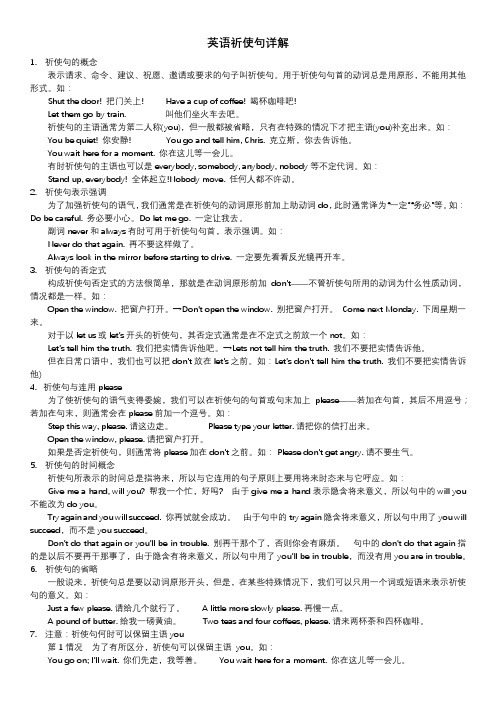
Step this way, please. 请这边走。Please type your letter. 请把你的信打出来。
Someone fetch a pail of water. 谁去打一桶水来。
3.有关祈使句最可能涉及的考点是:祈使句带主语以及“祈使句+and / then / or+陈述句”这一句型(祈使句表示条件)。另外,祈使句与反意疑问句一起考查也是高考一大特点。如:
英语祈使句详解
1.祈使句的概念
表示请求、命令、建议、祝愿、邀请或要求的句子叫祈使句。用于祈使句句首的动词总是用原形,不能用其他形式。如:
Shut the door! 把门关上!Have a cup of coffee! 喝杯咖啡吧!
Let them go by train.叫他们坐火车去吧。
祈使句的主语通常为第二人称(you),但一般都被省略,只有在特殊的情况下才把主语(you)补充出来。如:
Open the window, please. 请把窗户打开。
如果是否定祈使句,则通常将please加在don’t之前。如: Please don’t get angry. 请不要生气。
5.祈使句的时间概念
祈使句所表示的时间总是指将来,所以与它连用的句子原则上要用将来时态来与它呼应。如:
Give me a hand, will you? 帮我一个忙,好吗? 由于give me a hand表示隐含将来意义,所以句中的will you 不能改为do you。
2.祈使句表示强调
为了加强祈使句的语气,我们通常是在祈使句的动词原形前加上助动词do,此时通常译为“一定”“务必”等。如: Do be careful. 务必要小心。Do let me go. 一定让我去。
高中英语祈使句
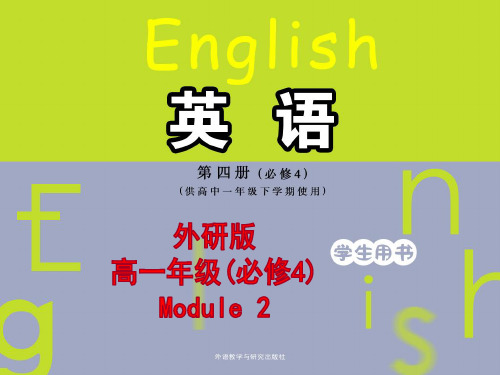
3. Let us pass, ___D____?
A. shan’t we B. shall we
C. won’t we D. will you
4. Wait a minute, ___B___?
A. shall you
B. will you
C. do you
D. don’t you
5. – Alice, you feed the bird today, ____?
1. 祈使句的否定式: 2. 第二人称祈使句一般在句首加
don’t; 第一人称祈使句一般在人称代 词后加not; 第三人称祈使句一般在 句首加don’t 。 有时为了加强祈使句的语气, 可以在 谓语动词前加do。
例如:Don’t be late again. Don’t let her be alone. Let us not talk of that matter. Do study hard at school.
B. will you
C. shall we
D. won’t you
以let’s 开头的祈使句用shall we, 以let us开头的祈使句用will you, 构成反意 疑问句。
• Finish the related exercises on WB.
• Review the grammar of this period.
祈使句
表示命令, 请求, 建议, 劝告或号召的句子 叫做祈使句。祈使句可分为第二人称祈使 句和第一, 三人称祈使句。祈使句的主语 为you, 通常省略, 谓语动词使用原形, 句末 用感叹号或句号。祈使句的主语为第一, 三人称句子结构为: Let + 动词原形+其他 成分或Let’s + 动词原形 + 其他成分。
高考英语:祈使句的常考点
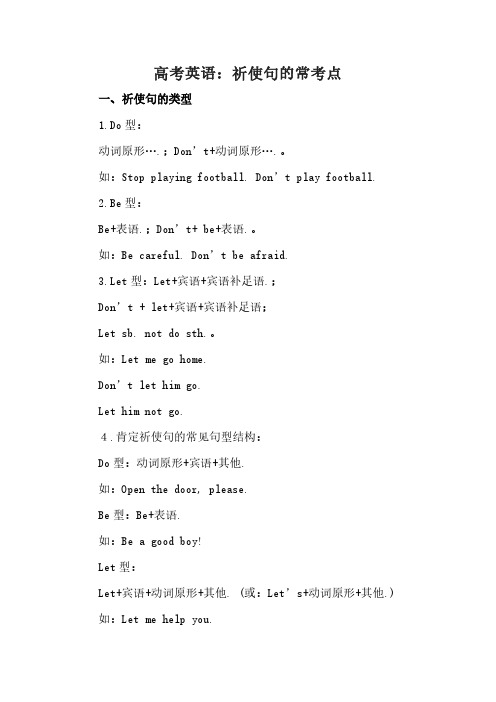
高考英语:祈使句的常考点一、祈使句的类型1.Do型:动词原形….;Don’t+动词原形….。
如:Stop playing football. Don’t play football.2.Be型:Be+表语.;Don’t+ be+表语.。
如:Be careful. Don’t be afraid.3.Let型:Let+宾语+宾语补足语.;Don’t + let+宾语+宾语补足语;Let sb. not do sth.。
如:Let me go home.Don’t let him go.Let him not go.4.肯定祈使句的常见句型结构:Do型:动词原形+宾语+其他.如:Open the door, please.Be型:Be+表语.如:Be a good boy!Let型:Let+宾语+动词原形+其他. (或:Let’s+动词原形+其他.) 如:Let me help you.Let’s play tennis.5.否定祈使句的常见句型结构:Do型和Be型的否定式:Don’t+动词原形 / be+其他.如:Don’t forget me.又如:Don’t be late.Let型的否定式:Don’t+let+宾语+动词原形+其他.(或:Let’s+not+动词原形+其他)如:Don’t let him go back.Let’s not go swimming.警示语:No+名词 / 动词-ing形式.如:No talking.二、祈使句的运用“祈使句+并列连词+陈述句”是一种很常见的句型,其中的并列连词有and(then)或or else,otherwise等,但比较常用的是and和or。
例如:1.Work hard and you will pass the examination.2.Hurry up or(else) you’ll be late.该句型中的祈使句相当于一个条件,而陈述句则相当于一个结果,也就是说,这种句型转换成一个含有条件从句的主从复合句。
祈使句必考知识点总结

祈使句必考知识点总结一、祈使句的构成:1. 一般祈使句:- 动词原形 + 句号(.)- 例如:Sit down.(坐下。
), Wait here.(在这里等一下。
)2. 一般祈使句的否定形式:- Do not + 动词原形 + 句号(.)- Don’t + 动词原形 + 句号(.)- 例如:Do not touch.(不要触摸。
), Don’t be late.(不要迟到。
)3. 祈使句中的助动词“do”:- 如果主语为第二人称(you)时,可以省略助动词“do”,直接使用动词原形。
- 例如:You sing.(你唱歌。
), You go.(你去。
)- 如果主语不是第二人称(you)时,需要加上助动词“do”。
- 例如:Let him do it.(让他做。
)4. 祈使句中的主语:- 一般来说,祈使句中没有明确的主语,但是可以通过上下文来确定主语。
- 例如:Open the door.(打开门。
), Please pass the salt.(请递盐。
)二、注意事项:1. 陈述句和祈使句的区别:- 陈述句是用来陈述事实或描述情况的句子,而祈使句是用来表达请求、命令或劝告的句子。
在语气上有明显的区别。
- 例如:You are late.(你迟到了。
)(陈述句), Don’t be late.(不要迟到。
)(祈使句)2. 祈使句的语气:- 祈使句通常用来表达请求、命令或劝告,语气往往比较强烈,并且常常省略了主语,显得更为直接。
- 例如:Shut the door.(关门。
), Don’t touch that.(别碰那个。
)3. 祈使句的礼貌用语:- 在一些情况下,为了表示礼貌,我们可以在祈使句中使用一些礼貌用语,比如“please”、“kindly”等。
- 例如:Please sit down.(请坐下。
), Kindly be quiet.(请安静。
)4. 祈使句的否定形式:- 祈使句的否定形式可以用“do not + 动词原形”或者“don’t + 动词原形”来表示,表示禁止做某事。
(完整版)高中祈使句精讲专题及练习【附答案】

祈使句一. 祈使句类型:1. 肯定祈使句,谓语动词用__________.如:小心:_________________ 不要说话了:________________注:此时主语通常为________, 但也可以是第三人称,如:Tom,小心。
__________________ 2. 否定祈使句,谓语动词用__________________如:不要粗心:_________________; ________________3. 以let开头的祈使句。
如Let sb. do sth. 或者Let’s do sth.4. 委婉的祈使语气:(1) ____________________________ (2)__________________________(3) ____________________________二. 祈使句考点:1. 祈使句,______________+陈述句如:(1) Be careful, _________ you will fail.(2) Be careful, ____________you can make it.注意变体形式:名词短语+and/or+陈述句如:(1) One more hour, _________ I will finish it.(2) One more hour, ___________ I could have finished it.2. 祈使句的反义疑问句:(1) 肯定祈使句:_____________________(2) 否定祈使句:______________________(3) 以let开头的祈使句:A. Let sb…, _________________________B. Let’s …., ________________________三. 陈述句的反义疑问句:1. 动词为be动词:_______________________如:This woman is our teacher, ________________?2. 动词为其他动词:_______________________________如:She wears a shirt, ________________________?3. 动词中有助动词,如________________, 此时______________________如:You have finished your homework, ______________________?4. 动词中有情态动词:A._________________________ B. __________________________(1) You can speak English, ________________?(2) must的反义疑问:You must finish your homework, ________________?You must be a student, _____________________?You must have met her, ____________________?She must have met him yesterday, ____________________?It must be going to rain tomorrow, ____________________?(3) dare/need的反义疑问:You need finish your homework, ________________?You need to finish your homework, ___________________?(4) ought to/should的反义疑问:You should finish your homework, ______________________?You ought to come here, ____________________?(5) have to的反义疑问:We have to cross the road, ________________?We had to cross the road, _________________?(6) used to的反义疑问:He used to be a student, ________________或者________________?5. There be句型的反义疑问句:_______________________6. 句子含有否定词:no, not, little, few, hardly, scarcely, seldom, nothing等时,反义疑问用_________;句子含有反义前后缀时,反义疑问用________________________________如: There is little water to drink now, _________________?It is impossible to make progress without hard work, ________________?7. 感叹句的反义疑问:________________________如: What a fine day, _________________?How exciting the game is, ____________________?8. 宾语从句的反义疑问:A. ___________________________; B. ___________________________如:I don’t think it is…., _________________? I think it is…, ________________?She doesn’t think it is…, ______________? She thinks it is…, _________________?9. 主语从句、动词ing形式做主语,反义疑问用________________________如:Protecting our environment is our duty, _________________?10. wish后接宾语从句,反义疑问用__________________四. 巩固练习:1. You’d rather watch TV this evening, ______?a. isn’t itb. hadn’t youc. wouldn’t youd. won’t you2. I suppose you’re not going today, ______?a. are youb. do youc. don’t youd. aren’t you3. I wish to shake hands with you, ______?a. shallb. may Ic. do Id. will I4. Three hours ought to be enough time, ______?a. oughtn’t three hoursb. didn’t theyc. shouldn’t itd. shouldn’t three hours5. They have to study a lot, ______?a. don’t theyb. haven’t theyc. did theyd. hadn’t they6. When the car crashed, your brother escaped being hurt, ______ ?a. didn’t heb. did hec. did itd. didn’t it7. I'm sure dirty, ______?a. am Ib. isn’t Ic. aren’t Id. am not I8. You seem to be dissatisfied with your present post. I don’t think you judged your ability objectively when you applied for it, ______ you?a. dob. didc. don’td. didn’t9. That’s the sort of the book yo u want, ______?a. is it d. isn’t that c. is that d. isn’t it10. All these dictionaries are a great help to you, ______?a. are theyb. aren’t theyc. are all these dictionariesd. aren’t all these dictionaries11. The movie that we saw last week was quite interesting, ______?a. wasn’t itb. was itc. didn’t wed. weren’t we12. Tom has been writing letters all afternoon, but he should have finished them by now, ______?a. hasn’t heb. has hec. shouldn’t hed. didn’t you13. David told me that you would take a trip to America, ______?a. would youb. wouldn’t youc. did youd. didn’t you14. There appeared to be no better way, _______?a. was thereb. were therec. did thered. didn’t t here15. You has some trouble finding where I live, ______?a. didn’t youb. hadn’t youc. do Id. don’t I16. He has his hair cut every month, ______?a. has heb. hasn’t hec. does hed. doesn’t he17. Your friend needs to come earlier, ______?a. does heb. doesn’t hec. need hed. needn’t he18. The little boy dare not go to church, ______?a. dare heb. daren’t hec. does hed. doesn’t he19. Susan’d have worked abroad if she’d had the chance, ______?a. has sheb. hadn’t shec. would shed. wouldn’t she20. Everyone’s having a good time, ______?a. is heb. isn’t everyonec. does hed. aren’t they21. Any one can join the club, ______?a. can any oneb. can’t any onec. can’t theyd. can they22. Tell me how to operate the electronic computer, ______?a. will youb. shan’t youc. do youd. don’t you23. Magaret scarcely comes to visit you on Christmas Day, ______?a. doesn’t sheb. does shec. do youd. don’t you24. Let’s listen to the radio program that the teacher mentioned, ______?a. do web. don’t wec. shall wed. shan’t we25. You think you’re funny, ______?a. didn’t youb. are youc. don’t youd. do you26. Janet used to take part in labor in that village, ______?a. used sheb. did shec. didn’t shed. should she27. What beautiful weather, ______?a. is itb. isn’t itc. won’t itd. doesn’t it28. He ought to go to Kwangchow by plane, ______?a. should heb. shouldn’t hec. would hed. wouldn’t he29. We never dared to ask him a question, ______?a. did web. didn’t wec. dared wed. daren’t we30. Nobody will believe how difficult his work has been ______?a. will heb. won’t nobodyc. will theyd. won’t they31. You must have made the mistake, ______?a. mustn’t youb. haven’t youc. didn’t youd. hadn’t you32. Learning how to repair computers takes a long time, ______?a. isn’t itb. aren’t theyc. doesn’t itd. don’t they33. Jack has coffee with breakfast, ______?a. hasn’t Jackb. hasn’t hec. doesn’t Jackd. doesn’t he34.They must have stayed at hotel last night, ______?a. mustn’t theyb. haven’t theyc. didn’t theyd. hadn’t they35.There isn’t anything wrong with the radio, ______?a. is thereb. is itc. does itd. does there36.You must be hungry, ______?a. must youb. mustn’t youc. are youd. aren’t you37.Let’s do the exercises by o urselves, ______?a. shall web. shan’t wec. will youd. will we38. Her daughter had the carpets and curtains cleaned, ______?a. had sheb. hadn’t shec. didn’t shed. didn’t her daughter39.The teacher had a talk with you, ______?a. has youb. hadn’t shec. did shed. didn’t she40.Something’ll have to be done about the air pollution, ______?a. won’t itb. will itc. has itd. does it反意疑问句练习答案。
高中英语语法祈使句知识点

高中英语语法祈使句知识点
高中英语语法祈使句知识点
只有表示一时的`行为的形容词才可用于be / dont be之后,如careful / careless, patient / impatient, quiet, silly等(be / dont be 通常不可与指状态的形容词连用,如hungry / thirsty, pretty)。
如:Be quiet! 安静点!
Dont be silly! 不要发傻!
Do be patient. 一定要有耐心。
Be careful about what you say. 说话要小心。
Be more careful with your work. 你的工作要再细心一些。
Be careful not to break anything. 当心别打破什么了。
Be sure you dont break any of them. 千万别把它们打破了。
Be sure to write to ma as soon as you get there. 到了千万给我来信。
Be sure and come as soon as possible. 一定要尽快来。
Be sure to send out all the invitations today. 一定要在今天把请帖都发出去。
注意有关的回答:
Be quiet! 别说话!
否定的回答:I wont! 我不嘛!
Dont be so impatient! 别这么着急!。
透视高考对 “祈使句”的考查
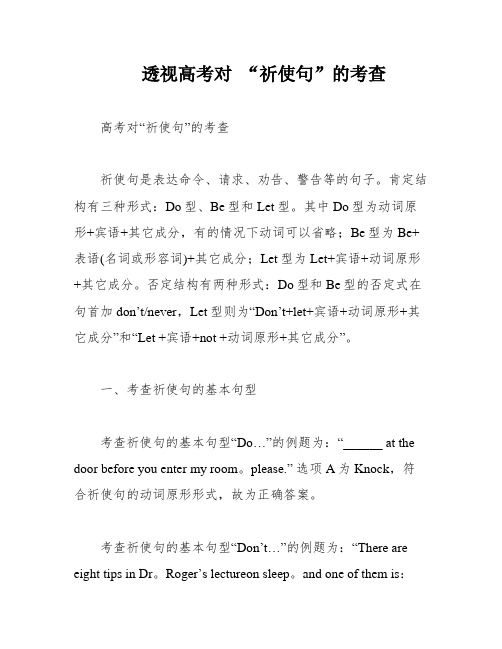
透视高考对“祈使句”的考查高考对“祈使句”的考查祈使句是表达命令、请求、劝告、警告等的句子。
肯定结构有三种形式:Do型、Be型和Let型。
其中Do型为动词原形+宾语+其它成分,有的情况下动词可以省略;Be型为Be+表语(名词或形容词)+其它成分;Let型为Let+宾语+动词原形+其它成分。
否定结构有两种形式:Do型和Be型的否定式在句首加don’t/never,Let型则为“Don’t+let+宾语+动词原形+其它成分”和“Let +宾语+not +动词原形+其它成分”。
一、考查祈使句的基本句型考查祈使句的基本句型“Do…”的例题为:“______ at the door before you enter my room。
please.” 选项A为Knock,符合祈使句的动词原形形式,故为正确答案。
考查祈使句的基本句型“Don’t…”的例题为:“There are eight tips in Dr。
Roger’s lectureon sleep。
and one of them is:______to bed early unless you think it is necessary.” 选项D为don’t go,符合祈使句的否定式形式,故为正确答案。
二、考查带主语的祈使句考查带主语的祈使句的例题为:“—Sorry。
Joe。
I didn’t mean to … —Don’t call me “Joe”。
I am Mr。
Baker to you。
and______ you et it!” 祈使句可加上主语you并放在动词前,该题中说话时为了提醒对方加上了对象“you”,故正确答案为D。
六、考查祈使句的反意疑问句当你看完那本书后,别忘了把它放回书架上,是吗?答案选择C。
本题考查祈使句的反意疑问句,根据主句确定,句中主名句是祈使句。
无论是肯定还是否定祈使句,一般用will you。
故答案选择C。
2006全国Ⅱ7】我们忘记带票了,请让我们进去,好吗?答案选择C。
祈使句重点讲解与练习

祈使句的回答
• 一.祈使句的动作通常是表示将来发生的动 作,所以回答祈使句时,一般用will或 won’t在回答具有否定意义的祈使句时,要 注意两点:一是形式一致,即Yes与will保持 一致;No与won’t保持一致。 • 二是意思相反,即Yes是不的意思;No是“ 是”的意思。在回答时,要注意分析上下 文语境中所提供的条件。 • 三,对于let us或let’s的表示建议的祈使句 常用OK. /All right. /Good idea.来回答
祈使句(重点讲解与练习)
◎祈使句
• 用于表达命令、请求、劝告、警告、禁止等的句 子叫做祈使句,祈使句最常用于表达命令,因此 在学校文法中也常称为命令句。 • Go and wash your hands. (命令) • Be quiet, please.(Please be quiet.) (请求) • Be kind to our sister. (劝告) • Watch your steps. (警告) • Look out!Danger! (强烈警告,已如感叹句) • Keep off the grass. (禁止) • No parking. (禁止) • No eating or drinking. (禁止) • No littering. (禁止)
• 否定结构: • 4. Let型 :“Don‘t + let + 宾语 + 动词原形 + 其它成 分”和“Let + 宾语 + not + 动词原形 + 其它成 分”。 • 注意:为了加强祈使句的语气,我们通常是在 祈使句的动词原形前加上助动词do,此时通常 译为“一定”“务必”等。如: • Do be careful. 务必要小心。 • Do have some more tea. 一定再喝点茶。 • Do let me go. 一定让我去。
英语祈使句讲法与练习和答案
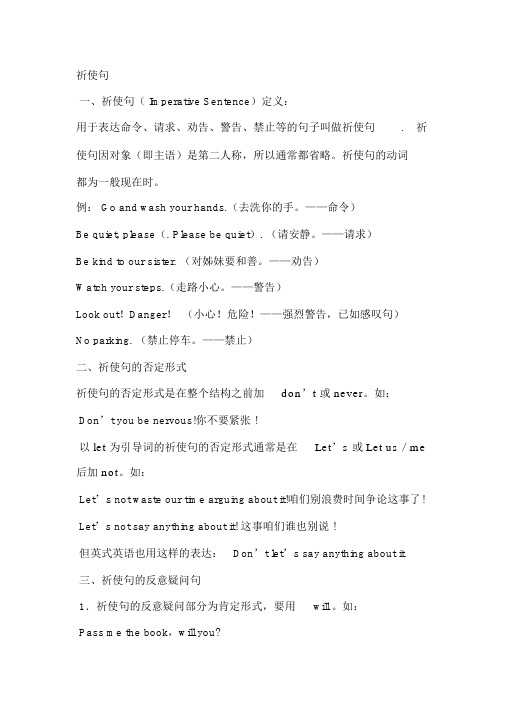
祈使句一、祈使句( Imperative Sentence)定义:用于表达命令、请求、劝告、警告、禁止等的句子叫做祈使句.祈使句因对象(即主语)是第二人称,所以通常都省略。
祈使句的动词都为一般现在时。
例: Go and wash your hands.(去洗你的手。
——命令)Be quiet, please(. Please be quiet). (请安静。
——请求)Be kind to our sister. (对姊妹要和善。
——劝告)Watch your steps.(走路小心。
——警告)Look out!Danger!(小心!危险!——强烈警告,已如感叹句)No parking. (禁止停车。
——禁止)二、祈使句的否定形式祈使句的否定形式是在整个结构之前加don’t 或 never。
如:Don’t you be nervous!你不要紧张 !以 let 为引导词的祈使句的否定形式通常是在Let’s 或 Let us/me 后加 not。
如:Let’s not waste our time arguing about it!咱们别浪费时间争论这事了! Let’s not say anything about it! 这事咱们谁也别说 !但英式英语也用这样的表达:Don’t let’s say anything about it.三、祈使句的反意疑问句1.祈使句的反意疑问部分为肯定形式,要用will 。
如:Pass me the book,will you?2.Let’s 表示第一人称的祈使句,反意疑问句为“Shall we?”。
如:Let’s go for a walk,shall we?Let’s forget it,shall we?3.Let me 和 Let us 表示第二人称的祈使句,反意疑问句为“will you?”。
如:Let us go for a walk, will you?4.其它行为动词引起的祈使句,无论其陈述部分是否定还是肯定的祈使句,多用“ will you? ”,表一种客气的语气。
祈使句知识点总结英语
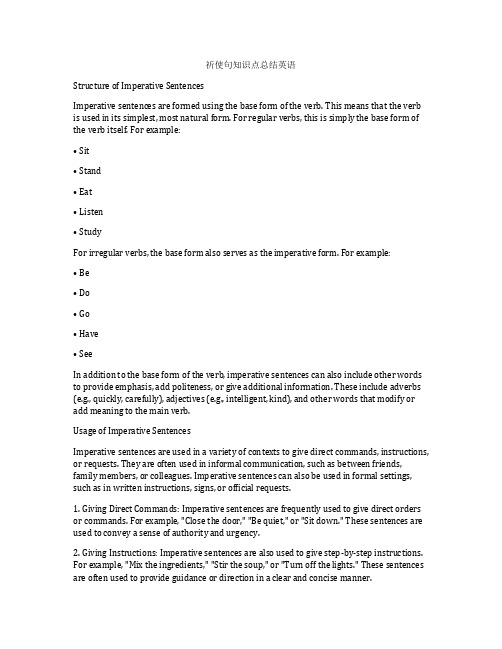
祈使句知识点总结英语Structure of Imperative SentencesImperative sentences are formed using the base form of the verb. This means that the verb is used in its simplest, most natural form. For regular verbs, this is simply the base form of the verb itself. For example:• Sit• Stand• Eat• Listen• StudyFor irregular verbs, the base form also serves as the imperative form. For example:• Be• Do• Go• Have• SeeIn addition to the base form of the verb, imperative sentences can also include other words to provide emphasis, add politeness, or give additional information. These include adverbs (e.g., quickly, carefully), adjectives (e.g., intelligent, kind), and other words that modify or add meaning to the main verb.Usage of Imperative SentencesImperative sentences are used in a variety of contexts to give direct commands, instructions, or requests. They are often used in informal communication, such as between friends, family members, or colleagues. Imperative sentences can also be used in formal settings, such as in written instructions, signs, or official requests.1. Giving Direct Commands: Imperative sentences are frequently used to give direct orders or commands. For example, "Close the door," "Be quiet," or "Sit down." These sentences are used to convey a sense of authority and urgency.2. Giving Instructions: Imperative sentences are also used to give step-by-step instructions. For example, "Mix the ingredients," "Stir the soup," or "Turn off the lights." These sentences are often used to provide guidance or direction in a clear and concise manner.3. Making Requests: Imperative sentences can be used to make polite requests. For example, "Please pass the salt," "Bring me the remote," or "Open the window." These sentences are used to ask for something in a direct and polite manner.4. Giving Advice: Imperative sentences can be used to give advice or suggestions. For example, "Be patient," "Take a deep breath," or "Don't give up." These sentences are used to offer guidance or support in a direct and reassuring manner.Examples of Imperative SentencesHere are some examples of imperative sentences in various contexts:1. Direct Commands:• Sit down.• Close the door.• Turn off your phone.• Finish your homework.2. Instructions:• Mix the ingredients.• Stir the soup.• Follow the signs.• Open the package carefully.3. Requests:• Please pass the salt.• Bring me the remote.• Open the window, please.• Can you lend me a pen?4. Advice:• Be patient.• Take a deep breath.• Don't give up.• Stay focused.Additional Considerations for Imperative SentencesWhen using imperative sentences, there are a few additional considerations to keep in mind:1. Use of Punctuation: Imperative sentences often end with an exclamation mark for a strong command or with a period for a more neutral command. For example, "Sit down!" or "Please close the door."2. Politeness and Context: The tone and politeness of an imperative sentence can vary depending on the context and relationship between the speaker and the listener. Adding "please" can soften the command and make it more polite, especially when making requests.3. Use of Pronouns: In imperative sentences, the subject is often omitted, but it can be implied based on the context or added for emphasis. For example, "You sit down" or simply "Sit down."In conclusion, imperative sentences are a versatile and important aspect of the English language. They are used to give direct commands, instructions, requests, and advice in a clear and concise manner. Understanding the structure and usage of imperative sentences can help improve communication and convey messages with clarity and authority. Whether in formal or informal settings, imperative sentences play a crucial role in everyday communication.。
祈使句知识点详解(初中英语专项复习)12
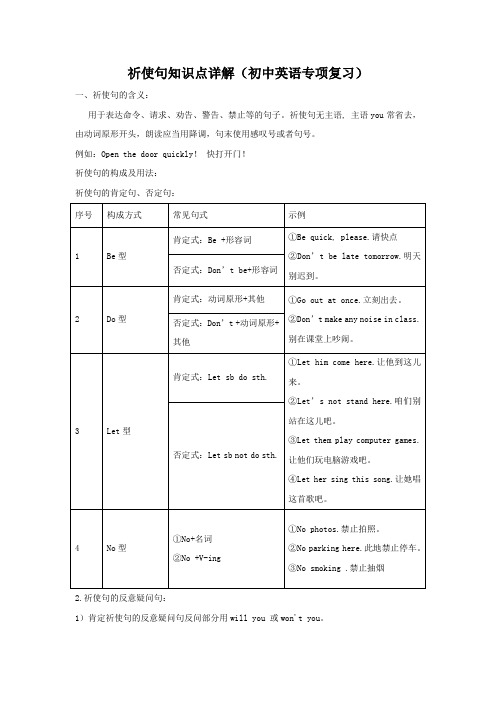
祈使句知识点详解(初中英语专项复习)一、祈使句的含义:用于表达命令、请求、劝告、警告、禁止等的句子。
祈使句无主语, 主语you常省去,由动词原形开头,朗读应当用降调,句末使用感叹号或者句号。
例如:Open the door quickly!快打开门!祈使句的构成及用法:祈使句的肯定句、否定句:2.祈使句的反意疑问句:1)肯定祈使句的反意疑问句反问部分用will you 或won't you。
Please open the door, will/ won’t you? 请把门打开,好吗?Be sure to write to us, will/ won’t you? 你一定要给我们写信,好吗?2)否定祈使句的反意疑问句反问部分只用will you。
Don't be late again, will you? 别再迟到了,行不行?Don’t smoke in the meeting room, will you? 不要在会议室抽烟,好吗?3)以let's开头的祈使句反意疑问句反问部分用shall we。
Let's turn on the TV, shall we? 我们把电视打开,好吗?以let us 开头的祈使句的反意疑问句的反问部分应为will you或won't you.例如:Let us stay here, will/ won't you? 请(你)让我们留在这好吗?3.祈使句的回答:祈使句的动作通常是表示将来发生的动作,所以回答祈使句时,一般用will或won’t。
在回答具有否定意义的祈使句时,要注意两点:1) 形式一致:即Yes与will保持一致;No与won’t保持一致。
2) 意思相反:即Yes是“不”的意思;No是“是”的意思。
在回答时,要注意分析上下文语境中所提供的条件。
例如:-Don’t go out, please. It’s raining heavily outside.请不要出去。
祈使句(讲义及解析)
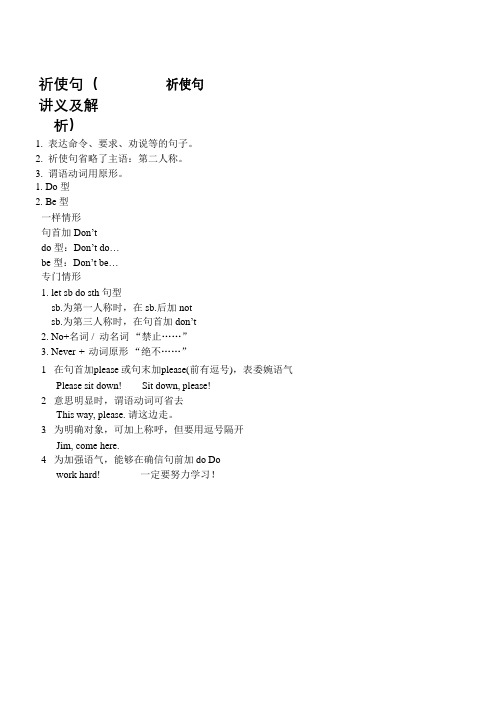
祈使句祈使句(讲义及解析)1.表达命令、要求、劝说等的句子。
2.祈使句省略了主语:第二人称。
3.谓语动词用原形。
1.Do 型2.Be 型一样情形句首加Don’tdo 型:Don’t do…be 型:Don’t be…专门情形1.let sb do sth 句型sb.为第一人称时,在 sb.后加 notsb.为第三人称时,在句首加don’t2.No+名词 / 动名词“禁止……”3.Never + 动词原形“绝不……”1.在句首加p lease 或句末加p lease(前有逗号),表委婉语气Please sit down! Sit down, please!2.意思明显时,谓语动词可省去This way, please. 请这边走。
3.为明确对象,可加上称呼,但要用逗号隔开Jim, come here.4.为加强语气,能够在确信句前加 do Dowork hard! 一定要努力学习!【精讲精练】一.翻译下列句子。
1.开门!2.现在起床并整理你的床铺。
3.对他严格点!4.把电视声音关小点。
5.慢点儿!6.吃慢点儿!7.早一点儿!8.让我们走吧!9.不要开门。
10.不要把电视声音关小。
11.不要对他严格!12.不要让她走!13.我们别去公园了!14.禁止讲话!15.禁止吐痰!16.不要迟到!17.绝不要迟到!【综合练习】一、用括号内所给动词的适当形式填空。
1. (say) it again.2. the window, please.3. (not, speak) with your mouth full of food and (be) polite.4. (not, let) the baby cry.5.Let’s(not, say) anything about it.6.No ! (fish)7.Never (cheat) others.二、单选。
1.Please me some money, will you?A.lendB. lendingC. to lendD. be lend2.the truth, or I won’t let you leave here.A.TellB. To tellC. TellingD. Tells3. out your love. The world will become a nicer place to live in.A.SpokeB. To speakC. SpeakD. Speaking4.He is not honest. believe him.A.NotB. Don’tC. To notD. Not to5. in bed. It’s bad for your eyes.A.Not to readB. Don’t readC. Don’t to readD. Not read6. your child. We’ll look after him.A.Not to worry aboutB. Don’t worry aboutC. Not worry forD. Don’t worry with7.worried about me, Mom. I’ve grown up.A.Don’tB. Don’t beC. NotD. Not be8. tell a lie.A.HardlyB. NotC. No D .Never9.Sindy, to be here at 8 o’clock.A.is sureB. is sure thatC. will be sureD. be sure10.Lily, the bike there.A.no putB. doesn’t putC. don’t putD. not put11.Jack, , or you will get heavier.A.doesn’t play sports any moreB.doesn’t eat so much meatC.don’t play sports any moreD.don’t eat so much meat12. when you cross the road.A.Do carefulB. CarefulC. Do be carefulD. To be careful13.—The math exam is coming. I’m very nervous.—Just . I’m sure you’ll do well in it.A.make progressB. pay attentionC. take it easyD. look out14.—May I speak to Mr. Smith?—, please. I’ll see if he is in.A.Look outB. Hold onC. Get upD. Come on15.Which is a traffic sign?A.KEEP QUIETB. DO NOT DISTURBC. TURN LEFTD. SOLD OUT三、完成句子。
[高中英语祈使句用法总结]祈使句的用法总结
![[高中英语祈使句用法总结]祈使句的用法总结](https://img.taocdn.com/s3/m/64952804bfd5b9f3f90f76c66137ee06eff94ec2.png)
高中英语祈使句用法总结祈使句是用来表示请求、命令、劝告或建议等语气的句子。
它的主语多是You(通常不说出)。
大家知道祈使句的用法是什么吗高中英语祈使句用法总结一、祈使句的分类祈使句分为第二人称祈使句,第一、三人称祈使句,还有一些不定代词祈使句共三大类。
1.第二人称祈使句通常是用来向听话人发出命令、提出要求或建议的。
这种祈使句的第二人称主语you通常省略,用动词原形开头。
如: Get out of here!滚开! Look here!注意! 2.第一、三人称祈使句是以第一人称、第三人称或者名词等作为祈使句的对象,这类祈使句通常以let为引导词。
基本结构:Let me go.但有时前面也可以加do,以加强语气。
如: Do let me go.一定让我去。
3.有时所表示的主语可以是everybody,omebody,anybody,nobody等不定代词。
如: Stand up,everybody!全体起立! Give me a hand,anybody!帮我一把,任何人都行! 祈使句除用谓语动词表示外,还可用名词、形容词、副词等。
如: Help!救人! Patience!要有耐心!Careful!小心! Quickly!快! Hand up!举起手来! 二、祈使句的附加疑问句祈使句之后可用附加疑问句,并不是与祈使句构成反意,而是加强语气,无论其前是否定还是肯定的祈使句,多用will you,表示一种客气的语气。
如:Don’t tell anyone,will you你可不要告诉任何人啊。
但在肯定的祈使句之后有时也使用won’t you,多表示“提醒对方注意”。
如:Tell me the truth,won’t you你可要告诉我实情啊。
以Let’开头的祈使句,其附加部分为hall we或han’t we;以Let u开头的祈使句,其附加部分为will you。
试比较:Let’ go out for a walk,hall we Let u have another try,will you 三、祈使句的否定形式 1.对于第二人称的祈使句,只要在整个句子结构之前加Don’t或Never 即可,即使祈使句有主语,也是如此。
- 1、下载文档前请自行甄别文档内容的完整性,平台不提供额外的编辑、内容补充、找答案等附加服务。
- 2、"仅部分预览"的文档,不可在线预览部分如存在完整性等问题,可反馈申请退款(可完整预览的文档不适用该条件!)。
- 3、如文档侵犯您的权益,请联系客服反馈,我们会尽快为您处理(人工客服工作时间:9:00-18:30)。
备战2019年高考英语考点一遍过专题36 祈使句(含解析)高考频度:★★★★★一、祈使句的句式特征祈使句常常是表达说话人对对方的劝告、叮嘱、请求或命令等。
因此,祈使句中一般没有主语,但根据其句意,实际上是省略了主语you。
祈使句句末用感叹号或句号,朗读时,常用降调。
在表达请求或劝告时,在祈使句前或句末可加上please,以使句子的语气更加缓和或客气。
祈使句一般没有时态的变化,也不能与情态动词连用。
Keep off the grass! 勿踩踏草地!Put the boxes in the small room. 把那些盒子放到那个小房间里。
二、祈使句的肯定句式祈使句的肯定句式一般分为以下三种类型:1. 行为动词原形+其他成分。
Make sentences after the model. 根据例句造句。
2. Be动词+其他成分(形容词、名词或介词短语等)。
Be careful when crossing the street. 过马路时要小心。
3. Let + 宾语 + 动词原形 + 其他成分。
Let him go back now. 让他现在回去吧。
Always _______________ in mind that your main task is to get this company running smoothly.A. to keepB. to have keptC. keepD. have kept【参考答案】C【名师点睛】祈使句表请求、命令、叮嘱、邀请、劝告等。
祈使句分为第二人称祈使句及第—、三人称祈使句两大类。
祈使句用于两个重要句型中:①"祈使句+and+表结果的陈述句"用来叙述肯定的条件;②"祈使句+or(else)+表结果的陈述句"用来叙述否定的条件,or(else)表示"否则";句首以动词原形开头。
从本题的成分来判断,可以看出是考查祈使句。
三、祈使句的否定句式祈使句的否定句式,通常情况下在句首加上Don’t或Never,一般分为以下四种类型:1. 在祈使句的肯定句式前加Don’t,构成"Don’t+行为动词原形+其他成分"。
Don’t say that again! 别再那样说了!2. 在Be动词引起的肯定祈使句前加Don’t,构成"Don’t be+其他成分(形容词、名词或介词短语等)"。
Don’t be careless. 不要粗心。
注意:在这种句型中be不能省略;否定副词not不可置于be之后。
3. Let引起的祈使句的否定形式有两种:(1)Let开头的祈使句,如果后面跟第一、第三人称名词或代词的宾格,可在Let前加Don’t,也可在Let后宾格的名词或代词后面加not。
(2)如果以Let’s开头的祈使句,必须在Let’s后加not。
Don’t let me go with her tomorrow. =Let me not go with her tomorro w. 不要让我明天跟她一起去。
Let’s not tell her the truth whenever we meet her.无论什么时候我们碰到她,都不要告诉她真相。
4. 在公共场合的提示语中,否定祈使句常用"No+名词/V-ing形式"结构,表示"禁止做某事"。
NO PHOTOS! 禁止拍照!四、祈使句的反意问句祈使句的反意疑问句须按其句子结构及讲话人的语气来决定其疑问部分。
通常有以下三种形式:1. 祈使句为肯定句式,其反意疑问句表示请求时,通常用will you;表示邀请、劝说时,用won’t you。
Be sure to write to us, will you? 你一定要给我们写信,好吗?Come to have dinner with us this evening, won’t you?今晚来和我们一起吃饭,好吗?2. 祈使句为否定句式,其反意疑问句通常只用will you。
Don’t smoke in the meeting room, will you?不要在会议室抽烟,好吗?3. Let开头的祈使句构成反意疑问句时,除Let’s用shall we外,其他均用will you。
Let the boy go first, will you? 让个那男孩先走,好吗?Let’s take a walk after supper, shall we?晚饭后我们去散步,好吗?1.We forgot to bring our tickets, but please let us enter, _________A.do youB.C. will youD. shall we【参考答案】CI’m sure you’d rather she went to school by bus,__________A.hadn’t youB.C. aren’t ID. didn’tshe【参考答案】B【答案解析】在反意疑问句中,如果主句的谓语动词是think, suppose, believe, imagine, be sure等,且主语为第一人称,简略问句仅有肯定或否定是与主句相对应,而主语和时态要与宾语从句一致。
五、祈使句的回答祈使句的动作通常是表示将来发生的动作,所以回答祈使句时,一般用will或won’t。
在回答具有否定意义的祈使句时,要注意两点:一是"形式一致",即Yes与will保持一致;No与won’t保持一致。
二是"意思相反",即Yes是"不"的意思;No是"是"的意思。
在回答时,要注意分析上下文语境中所提供的条件。
—Don’t go out, please. It’s raining heavily outside.请不要出去。
外面雨下得很大。
—Yes, I will. I have to meet my brother at the airport. 不行,我得去机场接我弟弟。
六、祈使句与陈述句的并列使用祈使句后接陈述句时,须用连接词连接。
如果祈使句与陈述句表示的是一种顺承关系时,要用并列连词and来连接;如果祈使句与陈述句存在一种否定条件关系时,要用并列连词or 来连接。
Leave it with me and I will see what I can do. 把它留给我吧,我想想有没有办法。
Hurry up, or we’ll be late.快点,否则我们要迟到了。
七、祈使句与条件状语从句的连用祈使句与条件状语从句连用时,条件状语从句可置于祈使句前或后。
Tell him to make a phone call to me if he comes here tomorrow. 如果他明天来这儿的话,叫他给我来个电话。
八、祈使句的强调形式祈使句的强调形式通常在肯定祈使句式前加上助动词Do(Do在句中无意义)。
Do shut up! 快住口!九、特殊形式的祈使句在英语中,有些祈使句不是以动词原形来引起一个祈使句,而是以一个名词短语来充当,且后接一个带有并列连接词的分句。
实际上,这个充当祈使句的名词短语相当于一个条件状语从句。
More water and the young trees couldn’t have died. =If you had given them more water, the young trees couldn’t have died.如果你给那些小树多浇点水的话,它们就不会死了。
__________A. B.C. Given one moD. If I have one more hour【参考答案】B【答案解析】本题考查"祈使句+and+简单句"的用法, 其中祈使句可转换成名词短语, 如One more word and I’ll beat you flat.因此B项正确。
如果选C, D两项, 要去掉and。
十、运用祈使句的误区祈使句往往容易与不定式、分词或条件状语从句相混淆。
在平时的练习或测试中,如果稍不留神,就会出错。
因此,要认真审题,认真分析句子结构,并根据上下文语境,作出正确判断。
_______________ your composition carefully, some spelling mistakes can be avoided.A. Having checkedB. CheckC. If you checkD. To check【参考答案】C题组一能力过关1. There are a few measures you can take to improve your grade, and one of them is:____________ the material you do poorly in.A. doesn’t ignoreB. not to ignoreC. not ignoreD. don’t ignore2. _____________ in the library, or you’ll be fined 10 dollars and banned from entering for one month.A. If you smokeB. Not smokeC. Not smokingD. No smoking3. —Daddy, this is my favorite show. Could you...?—No. _______________ before the TV set and I’ll cancel our plan to Disneylandtomorrow.A. Have more minuteB. One more minuteC. Given one more minuteD. If you have one more minute4. If you have a job, _____________ yourself to it and finally you’ll succeed.A.do devoteB. don’t devoteC. devotingD. not devoting5. _______________ your homework before you watch TV.A. DoB. DoingC. To doD. Done6. Follow your doctor’s advice, ______________ your illness will get better.A. thenB. orC. andD. but7. _______________ to the answer, and then you will find where your problem is.A. To referB. ReferringC. ReferredD. Refer8.When you’ve finished with that book, don’t forget to put it back on the shelf, ______________?A.do youB.C. will youD. won’t you题组二体验真题1.(2017·新课标卷I·短文改错)I The instructor kept repeating the word(改为words), "Speed up!""Slow down!""Turning left!"2. (2016·新课标卷Ⅱ·语法填空)It could be anything —gardening, cooking, music,sports —but whatever it is, __________ (make) sure it’s a relief from daily stress rather than another thing to worry about.题组一能力过关1. D 【解析】考查祈使句。
